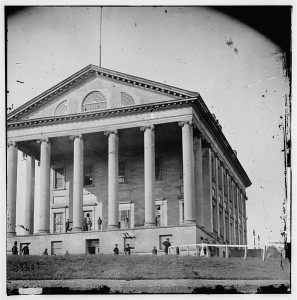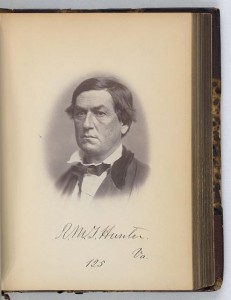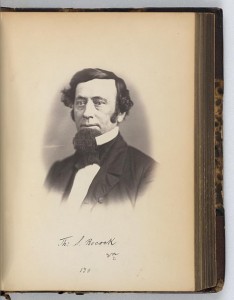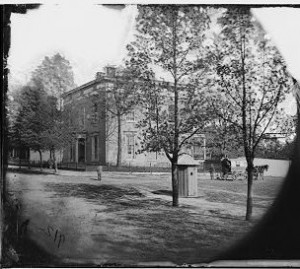150 years ago today the first elected Confederate Congress convened in Richmond, Va. From the Richmond Daily Dispatch February 19, 1862:
Confederate Congress.
first session.
Yesterday along before the hour arrived, a large crowd had assembled at the Capitol to witness the inauguration of the Permanent Government of the Confederate States, in the convocation and organization of the new Congress. The hall of the House of Representatives, for half an hour previous to the tap of the Speaker’s gavel, was a complete jam, the crowd consisting of the members elect, the members of the Virginia Legislature, citizens, and last, though not least, a considerable number of ladies — all anxious to witness the proceedings incident to an occasion so interesting, and yet so solemn and impressive. Dense as was the throng, and meagre as the accommodations were, there was not the slightest demonstration of disorder, and everything passed off quietly.
Senate.
Tuesday, Feb. 18, 1862.
The Senate convened at noon. The Vice President elect of the Confederate States, Hon. A. H. Stephens, in the Chair.
The Vice President, under the authority of the Constitution, formally opened the session of the Senate. He called the attention of Senators to the published acts passed by the Provisional Congress, and caused the temporary clerk to read the last clause of the permanent Constitution; also, the act of the Provisional Congress putting in operation the permanent Government of the Confederate States, and the act supplemental to the same.
The roll being called, the following Senators answered to their names:
* Arkansas–Mr. Mitchell and Mr. Johnson.
* Florida–Mr. Maxwell and Mr. Baker.
* Georgia–Mr. Hill
* Kentucky–Mr. Simms.
* Louisiana–Mr. Sparrow.
* Mississippi–Mr. Brown.
* Missouri–Mr. Clark and Mr. Peyton.
* North Carolina–Mr. Davis and Mr. Dortch
* South Carolina–Mr. Barnwell and Mr. Orr.
* Tennessee–Mr. Haynes and Mr. Henry.
* Texas–Mr. Oldham.
* Virginia–Mr. Hunter and Mr. Preston.
Nineteen Senators being present, (a quorum,) the oath to support the Constitution was then administered. The Senators taking the oath in parties of four at a time.
The Vice President announced that the first business before the Senate was the election of a President of the Senate pro tempore.
Mr. Davis, of North Carolina, moved that the Hon. R. M. T. Hunter, of Virginia, be unanimously chosen President of the Senate pro tempore. Carried. …
Another article in the same edition detailed activities in the House:
House of Representatives.
At 12 o’clock precisely, the House was called to order by Hon. Howell Cobb, of Georgia, the presiding officer of the late Provisional Congress, who stated that it was made his duty by an act of the Provisional Congress to preside over the Permanent Congress until its organization. An earnest and impressive prayer was delivered by the Rev. Mr. Duncan, of the M. E. Church.
The call of the roll of the members was then commenced, and at its conclusion the presiding officer announced that a quorum was present, after which he proceeded to administer the following oath, which was done by calling up the delegations from the several states of the Confederacy:
“You and each of you do solemnly swear that you will support the Constitution of the Confederate States: So help you God.”
This was the most deeply impressive part of the whole ceremony. As the delegation from each State gathered around the desk of the Speaker, a solemn stillness pervaded the entire hall, and the whole crowd, members and spectators, seemed to feel the responsibility which rests upon this new, and as yet untried, body.
Each delegation having thus reverently qualified to assume the high and honorable [ responsiblity ] of supporting the Constitution of the new Government, Mr. Cobb announced that the next duty devolving upon them was the election of a Speaker to preside over their future deliberations.
The nomination of candidates for Speaker being in order, Mr. Foote, of Tennessee, offered a resolution declaring Hon. Thos. S. Bocock, of Virginia, the choice of the House for Speaker. The resolution of Mr. Foote was adopted with but one or two dissenting voices, and Mr. Bocock was duly declared the Speaker elect of the first Congress under the permanent Government of the Confederate States. …
After assuming the Chair, the new Speaker delivered the following patriotic address, which was listened to with marked attention, and was received, at its conclusion, with warm applause:
Gentlemen of the House of Representatives:…
The unanimity with which you have made this election is a happy augury of the spirit with which your proceedings will be governed. This is no time for resentments, no time for jealousies or heart-burnings. Influenced by a great common purpose, sharing together the same rich hope, and united by a common destiny, let us hush every murmur of discontent and banish every feeling of personal grief. Here let us know no man, save as a co-laborer in the same great cause, sustaining those whom circumstances may designate to go forward; seeking nothing for the sake merely of personal gratification, but willing rather to yield everything for the public good; “in honor preferring one another.”
That some of you, influenced by momentary impulse, should grow restive under the enforcements of those rules which you may make for your own government, would be a matter neither of surprise nor of complaint. But he will prove himself either a weak or a bad man who; on reflection, fails to call back his wayward spirit and subject it to necessary restraint. Submission to constituted authority is the primary necessity in all communities, and self-control is the chief lesson of individual life.
In the light of passing events, we can measure the height and the depth of the excellence intended to be conveyed, when it is said, “Better is he who ruleth his own spirit than he who taketh a city.” …
The Dispatch did not mention either Alabama senator being present. Virginian Robert Mercer Taliaferro Hunter had been serving as CSA Secretary of State since July 1861. Thomas Stanley Bocock was another Virginian. Bacock was the prosecuting atttorney for Appomattox County in 1845 and 1846. He served in U.S. House from 1847 until 1861. Bacock was nominated for U.S. House Speaker in 1859 but withdrew after several ballots failed to elect anyone. The well-known Louis Wigfall slipped into his senate seat after the session began and took the oath after voting for the various offices was completed.




